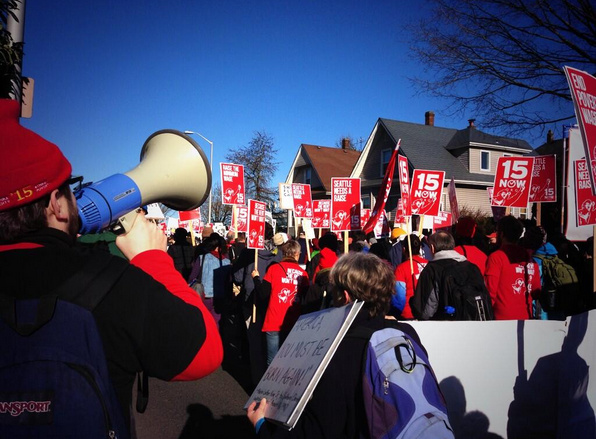
It’s the dog days of a Seattle winter, and tempers are growing short. The initial enthusiasm for a $15 an hour minimum wage remains strong, but it has been joined by a more contentious hashing out of the details of how we get there—and who is included. 68% of Seattle voters have indicated they support a $15/hr wage floor. More specifically, they support getting there as soon as possible, and covering as many workers as possible without exclusions or loopholes.
Raising the wage is clearly popular. But it’s not easy. As the prospect of a $15/hr wage looms, concerns are being voiced by small businesses such as Elliott Bay Books, afraid it will force them to close their doors. Those concerns are causing some supporters of a higher wage, sympathetic to these local retailers, to call for compromise even if it means excluding large swaths of working Seattle. After all, good urbanism includes a strong base of locally owned businesses.
It’s an understandable reaction. Yet it is still wrong. Fighting for a higher wage is about more than battling large corporations and hesitant elected leaders. It’s also about taking on nearly 40 years of right-wing economic dogma that is largely responsible for stagnating wages in the first place. The notion that workers’ wages must suffer for business to thrive is a false one, but after four decades of it being pounded into American minds by relentless right-wing messaging, even progressive Democrats have come to believe it is true.
It’s also about taking on flawed notions of how we make policy in America. Seattle in particular has a strange fetish for technocracy, driven by the long-term weakness of the extreme right statewide, a strong tradition of liberal Democrats in Western Washington, and a city government that is largely honest and free of corruption. Those factors notwithstanding, policy is made here the same way it is everywhere else – through negotiations, mobilizing your supporters, and running campaigns to get as close as you can to your desired goal, even if you have to make a few deals along the way.
Together, the hoary notion that higher wages undermine small business, and the idea that policy-making requires compromise up front, make raising everyone’s wage more difficult than it needs to be. I want to suggest some ways out of this dilemma that can help Seattle assert national leadership in building a more equal economy for everyone.
The first and most important step is to reject the argument that a higher wage is what would cause a business to go under. For nearly 40 years that claim has driven American economic thinking and all it’s gotten us is a stagnating wage and more people living in poverty despite holding down full time jobs. Since 1973 wages for non-supervisory retail workers have fallen by 30 percent when adjusted for inflation.
The evidence is clear—raising the wage never has the dire impacts that businesses fear it will. In 2012 San José, California raised its wage by 25% from $8/hr to $10/hr. Initial concerns have given way to acceptance and even support as businesses realized they could adapt. Large and small businesses complained in the late 1980s and again in the late 1990s when Washington State raised the wage. Washington now has the highest minimum wage in the country (at least until California fully implements its new $10/hr wage in 2016). It also has a higher job creation rate than the national average.
Perhaps this is because, as research from Good Jobs Seattle shows, businesses will also see increased consumer spending that helps offset higher wage costs. An Economic Policy Institute study found that, based on numbers from the Federal Reserve, every dollar increase in the minimum wage led families to increase spending by about $2400 per year.
No wonder small business owners were among those speaking out in favor of the $15/hr wage at Wednesday night’s town hall meeting. They understand that we don’t have to smash workers’ wages to support local businesses.
Other businesses, like Elliott Bay Books, continue to charge that raising the wage will raise their costs so high that it will force them to close. The truth is that there is a wide range of factors that contribute to a business’s costs. Why is it that a wage is the one that is make or break? Businesses often complain about regulations. Yet there would be very little public support in Seattle for relaxing safety rules at a construction site, or health rules at a restaurant, even though doing so would almost certainly save those businesses money.
If we feel these small, local businesses need our help, the city can look at all kinds of programs, incentives, and maybe even tax credits or tax breaks. We could also look at ways that larger businesses are favored by local and state policies and address those, rather than try to protect the neighborhood bookstore by holding down wages. Some of those ideas may be practicable and desirable, and some might not. But there are many options open to us other than telling workers they have to accept poverty wages in order to keep their jobs. After all, most Washington progressives reacted with anger when Boeing made exactly that same demand of its machinists recently, insisting they give up their pensions in order to keep their jobs.
Just as we insist all businesses respect health and safety rules, we must also insist they all pay their workers at least a $15/hr wage. No exceptions, no loopholes. Otherwise we will perpetuate a two-tier economy where some workers do well and others continue to struggle to afford rent. A universal wage increase doesn’t mean we are consigning popular local businesses to the dustbin of history. It just means all of us—owners, workers, consumers—are refusing to buy into the right-wing’s frame on wages and jobs. It means we’re going to innovate better solutions that match our values rather than undermine them. Solutions that emphasize the needs of workers, rather than subordinate those needs to those who own businesses.
One possible innovation that is frequently discussed is to phase in the increase to $15/hr rather than jump to it all at once. I personally don’t believe phasing is necessary, but I’m open to it if it’s done quickly. Dominic Holden, news editor at the Stranger, believes phasing is the right path to take. But he also believes it’s the only reasonable thing for anyone to advocate now, and on Wednesday evening he criticized Councilmember Sawant for refusing to say she’d support a phased increase:
If Sawant wants to be persuasive to both sides—including folks who support $15 an hour and voted for her (hiya!)—she needs to identify the specific policy that she, and other folks, can get behind. It will only make her more credible at the bargaining table. If she isn’t willing to have that conversation, folks will have it without her.
I understand where Holden is coming from, and I believe he’s trying to be helpful. But this approach isn’t the right way to win this battle. First, the credibility of anyone seated at the bargaining table comes not from the detail of their proposals, but by the public support they can mobilize for their position. This is true for Sawant, for Seattle Mayor Ed Murray, for the labor unions, and for the businesses who are all participating in the city’s commission on the issue. If policy-making was about the best ideas coming out of a reasoned process, we would not be in this economic mess in the first place.
Second, Holden is arguing that Sawant has to compromise in advance if she’s to be taken seriously. President Barack Obama routinely makes these same arguments when he pre-compromises before negotiating with Republicans. Obama’s penchant for pre-compromising has been repeatedly denounced by fellow Democrats such as Senator Harry Reid, who charged that Obama made the debt ceiling fights and federal austerity worse by giving into Republican demands in advance, as well as progressive pundits like Paul Krugman, who believe that the 2009 stimulus was too small to fully fix the economy because Obama compromised even before it went to Congress for debate.
Obama’s pre-compromising failed because he gave away his power in advance. He could have driven a better bargain had he stuck to his principles before walking into the room with Republicans. In fact, Obama and Congressional Democrats at long last signaled they would not compromise with the GOP on the debt ceiling and as a result the GOP is no longer extorting over the debt limit.
Sawant has been a close observer of American politics in recent years, and drew the correct lessons from these experiences. She knows that you win a negotiation not by ceding your position in advance, but by starting from a maximalist position and rallying support for it. You show an openness to flexibility, but you never share what your real bottom line is. You use your position of strength to try and get the other parties to concede first so that the final deal is closer to your liking. And you retain the option to cut whatever deal fits your goals and values once negotiations have come down to the wire. That’s especially important when faced with a powerful group of businesses working hard to water down the push to raise the wage.
If you read closely the response Sawant gave to Holden’s questions you’ll see that’s exactly her approach. She does not rule out a later compromise or deal that might include a phased approach. But she is wisely refusing to concede that phasing is necessary. She doesn’t believe it is, she doesn’t believe that workers want that, and so she refuses to bow to demands from the media that she concede that position in advance. Only if she’s forced to that point by the workers and by what happens at the bargaining table will she go there. That’s a smart, strategic, sensible approach to policy-making and negotiating.
Such an approach sometimes seems novel. But that’s not a reflection on Sawant, who is showing the same savviness that labor leaders and progressive politicians used to show in the years before the great right-wing reaction began in the 1970s. In the last few decades we have gotten so used to left-of-center politicians being spectacularly bad at policy negotiations that we have forgotten what it looks like when they get it right.
Getting Seattle to a $15/hr minimum wage requires us to throw out four decades of flawed economic and political thinking. And that’s one of the most important side effects of the fight to raise the wage. It helps us start clearing the decks of all those compromises that undermined workers and caused their wages to stagnate for nearly 40 years. Raising the wage to $15/hr creates new political opportunities by assuming workers should be paid well, rather than expecting that they should be paid poorly, in order for our economy to function for everyone. It forces us to look at other ways to help smaller local businesses – including going after the subsidies their large corporate opponents routinely receive.
Kshama Sawant clearly understands this, and that’s why I’m glad she’s on the City Council to fight for working people everywhere. I hope that she and everyone else in Seattle continues to stand for implementing a $15/hr minimum wage, covering everyone working in Seattle, as soon as possible. We’ve waited long enough.

Robert Cruickshank
Robert is the Director of Digital Strategy at California YIMBY and Chair of Sierra Club Seattle. A long time communications and political strategist, he was Senior Communications Advisor to Seattle Mayor Mike McGinn from 2011-2013.

